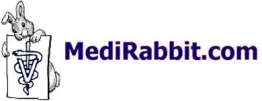Differential Diagnosis for Ptyalism
(excessive
production of saliva, drooling, slobbering)
MediRabbit.com is funded solely by the
generosity of donors.
Every donation, no matter what
the size, is appreciated and will aid in the continuing research of medical care
and health of rabbits.
Thank you
|
When the causes are not found,
or the treatment does not stop the excessive drooling, local alopecia can
develop, showing a raw inflamed skin. This condition is painful.
Secondary bacterial or fungal
skin infection may develop.

Photo: courtesy of Kim Chilson
Anna, suffering from several health problems including a runny eye that was not
linked to dental problems, extraction of incisors.
|
Symptoms |
Differential diagnosis |
|
Ptyalism is differentiated between acute drooling or chronic drooling. In each case, the cause of excessive production of saliva
is different. |
|
Acute ptyalism |
Epiglottitis |
|
Neoplasia
or presence of a tumor |
|
|
Presence
of an abscess |
|
|
Pain |
|
Chronic ptyalism |
Neurologic
trauma (e.g., stroke) |
|
Medication
(analgesics, anticonvulsants, anticholinesterase) |
|
|
Obstruction
in the nasal cavity (e.g., presence of polyps) |
|
|
Size
of the tongue |
|
|
Position
of the head |
|
|
Sitting
or lying position |
|
|
Stress |
|
|
Diseases,
e.g., rabies or tetanus |
|
Further causes for ptyalism relate to tooth problems. |
|
Bacterial
causes |
Tooth
root abscess |
|
Inflammation
of the tongue |
|
|
Cheek
abscess |
|
Oral or
gastro-intestinal causes |
Oral
ulcerations |
|
Epulis, (tumor or growth on the gum) |
|
|
Stomatitis (inflammatory condition of the mouth, resulting from
infection by bacteria, viruses, or fungi, from exposure to certain chemicals
or drugs, from vitamin deficiency). |
|
|
Bloat, or an abnormal collection of gas in the stomach, or cecum.
In this case the stomach feels swollen and the rabbit is in pain. |
|
|
Gastroesophageal reflux |
|
|
Gastric
distension |
|
|
Acute
gastritis (inflammation
of the lining of the stomach), caused by surgery, aspirin or other drugs, by
food allergens or by the presence of viral, bacterial, or chemical poisons. |
|
|
Pancreatitis
(e.g., presence of gallstones, infection or medication) |
|
|
Digestive
organ failure (e.g., liver disease) |
|
Respiratory
causes |
Inflammation
of the pharynx, bronchia and lungs (e.g., alveolar abscess) |
|
Pharyngitis (inflammation of the pharynx), where the compromise passage of air can
lead to respiratory distress, and one symptom, among others is drooling. |
|
Cardiovascular causes |
Portosystemic shunts, a congenital or acquired vascular abnormalities
that permit portal blood flow to bypass the liver and enter the systemic
circulation directly. In small animal, this is characterized by drooling. |
|
Food |
Nutrient
deficiency, e.g., folate deficiency, chronic fluorosis, subacute scurvy |
|
Mechanical causes |
Presence
of a trapped foreign body between molars (e.g., hay, fur) |
|
Overgrowth of the crown of the tooth (e.g., presence of spikes) |
|
|
Malocclusion
of the front teeth |
|
|
Odontoclastic lesions (small to large enamel defects right at the gum
line) |
|
|
Broken
tooth |
|
|
Broken
maxillary bone |
|
|
Wounded
or lacerated tongue and/or gums |
|
Nervous causes |
Stress |
|
Pain |
|
Toxicity |
Medication |
|
Toxins |
|
|
Poisoning |
e-mail: info@medirabbit.com



